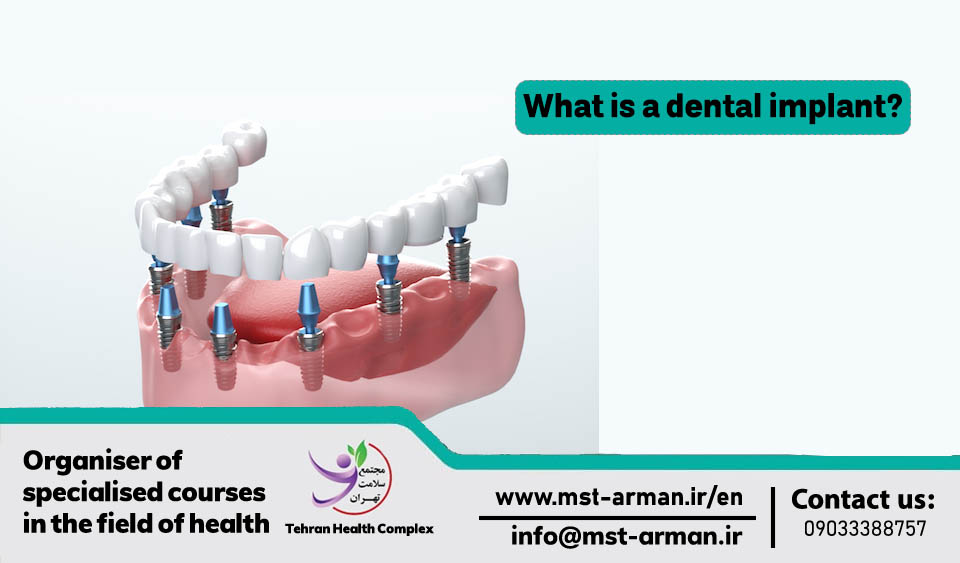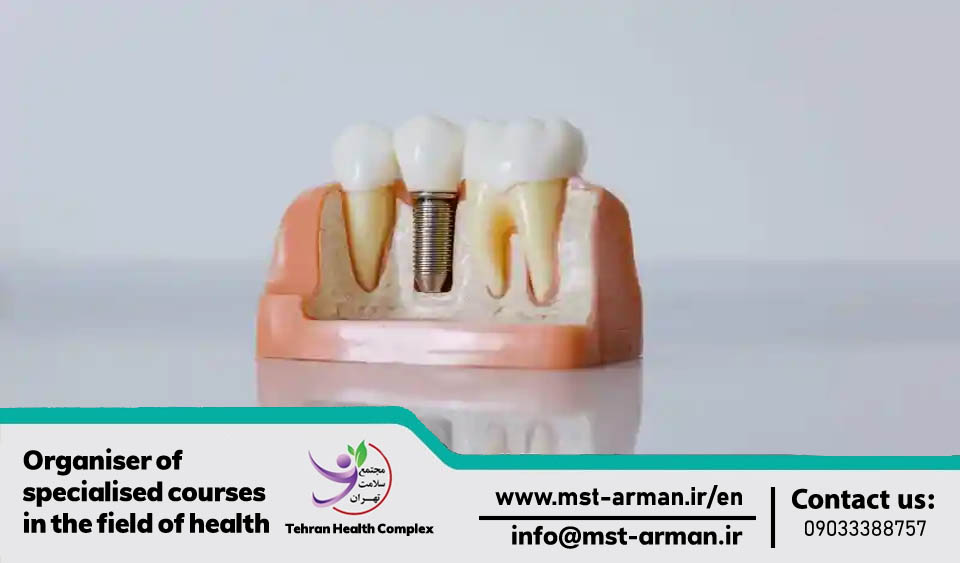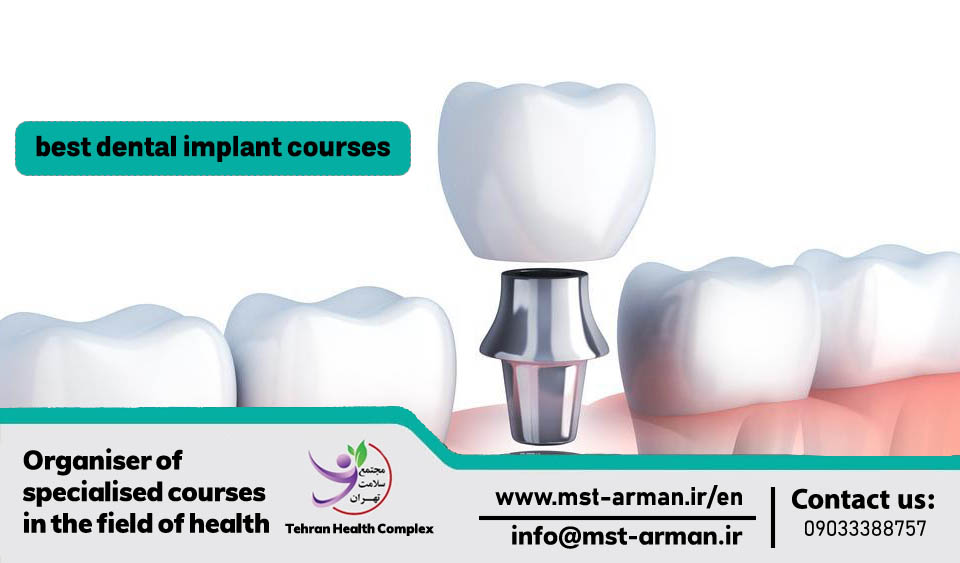When you receive your general doctorate degree, several different thoughts come to you, such as whether it is better to continue studying or to work in public education?
Many clients who participate in the best dental implant courses in Tehran Health Complex share such thoughts with us and we suggest them to participate in this course and improve their knowledge. If you agree, let’s get acquainted with this type of treatment and introduce the best dental implant course.
What is a dental implant?
Dental implant surgery is a process in which tooth roots are replaced with metal supports similar to screws, and damaged or missing teeth are replaced with artificial teeth that closely resemble real teeth in appearance and function. Dental implant surgery may be an acceptable alternative to dentures or dental bridges that do not fit together properly and may be an option when the natural roots of the teeth do not allow for a denture or bridge replacement.

What is dental implant?
How to perform dental implant surgery depends on the type of implanted piece and the condition of the jaw bone. Dental implant surgery may include several procedures. The main advantage of implant components is that they provide a solid support for the new tooth – this process requires complete bone healing around the implant component. Since this treatment takes time, it may take several months.
What is a dental bridge?
An implant-based bridge, like a regular dental bridge, is a type of dental restoration that is made specifically for the patient to fill the gaps in the teeth. An implant-based bridge, unlike a normal bridge, is not connected to natural teeth, but instead, it is connected to implant bases. A dental implant is placed inside the jaw bone during a surgery.
Why are dental implants done?
Dental implants are surgically placed in your jawbone, where they act as the roots of missing teeth. Because the titanium in implants fuses with your jawbone, implants do not slip, make noise, or cause bone damage that can occur with fixed bridges or dentures. It also doesn’t decay like your teeth, whereas a regular dental bridge can.
Who are dental implants suitable for?
In general, dental implants may be right for you if:
- You have one or more missing teeth
- You have a fully developed jawbone
- You have adequate bone to anchor the graft or you can
- accommodate a bone graft
- You have healthy oral tissue
- You do not have a medical condition that affects bone healing
- You cannot or do not want to use dentures
- You want to improve your speech
- You were determined to devote several months to this process
How are dental implants applied?
The specialist dentist determines whether the patient is suitable for implant treatment or not. If the measurements show that the bone structure is suitable for implant treatment, the application phase begins. If the bone and gum structure is unable to support the implant, additional orthopedic surgery may be required.

dental implants
Implants are placed by a dental surgeon under local anesthesia with minor surgery in the bone. After this procedure, the implant is expected to fuse with the jawbone in an average of two to four months. In cases where the bone surface is sufficient and there are no inflammatory conditions, the implant can be placed in the area immediately after tooth extraction on the same day.
During this period, the implant acquires the function of a real tooth root. In the final stage, the prosthesis is placed on the root of the new tooth made from the implant and the treatment is finished. Of course, all the mentioned things are taught to you dear doctors in the best dental implant courses.
Advantages of using implants
- Implanted teeth do not affect adjacent healthy teeth. There is no incisor for a healthy tooth.
- It offers perfect functionality both in terms of aesthetics and performance. The person to whom the treatment is applied regains the function and beauty of chewing.
- Implants do not create an additional feeling in the mouth. It looks like real teeth.
- It is very resistant. If proper oral care is followed, they can be used for many years, even a lifetime
Risks of using implants
Like any other surgery, dental implant surgery also has health risks. Problems are rare, but when they do occur they are usually minor and easily treatable. The risks are:
- Inflammation at the implant site
Injury or damage to structures around the tooth, such as teeth or other blood vessels, nerve damage that can cause pain, numbness, or tingling in your natural teeth, gums, lips, or chin.
- Sinus problems
When dental implants are placed in the upper jaw, they protrude into the sinus cavities.
When requesting a bone graft
If your jawbone is not thick enough or too soft, you may need a bone graft before dental implant surgery. This is because intense chewing puts a lot of pressure on the jawbone, and if there is not enough bone to support the dental implant, the surgery is likely to fail. Bone grafting can provide a stronger foundation for dental implants.
There are several bone graft materials that can be used to regenerate the jaw bone. Options include natural bone allografts, such as grafts taken from elsewhere in the body, or artificial bone allografts, such as bone substitutes that provide a scaffold for new bone growth. Talk to your doctor about the best option for you.
This process may take several months for the implanted bone to grow enough to form new bone to support the dental implant. In some cases, you may only need a partial bone grafting procedure that can be performed at the same time as the dental implant surgery. The condition of your jawbone determines your progress.
The question is whether these things will be taught to you in the best dental implant course or not?! It must be said, yes, it is taught.
Necessary care after dental implant
Practice good oral habits. Just like your natural teeth, keep your implants, dentures, and gum tissue clean. Use specially designed brushes or floss. Visit the dentist regularly. To ensure the health and safety of implant function, schedule dental exams and follow professional cleaning procedures recommendations.
Avoid bad habits. Do not chew on hard objects such as ice and hard candies, which can break the crowns of your teeth. Avoid using tobacco, which stains the teeth, as well as caffeinated products. If you feel that you are grinding your teeth, seek treatment.
Introducing the best dental implant course in Iran
This course has specialized dental implant topics that dentists who want to learn this skill can start doing dental implants by passing it. The implant course is held with the training of expert professors such as Dr. Mohammad Ali Asaish (specialist in oral, maxillofacial and cosmetic surgery) and Dr. Saeed Ipakchi (specialist in dental prostheses and implants) and these professors with their high experience in teaching and dentistry are our best options. They were for teaching.
The topics of the dental implant course in Tehran Health Complex include:
- Perio surgery
- Knowing the performance and parts
- Flap and flap design
- Risk of involvement of anatomical and functional anatomy areas
- System of drills and implantation
- Microscopic and macroscopic characteristics of fixtures
- Implantation and immediate implant detection
- Sinus lift
- The hands of that surgery
- Digital in implant (radiology)
- Imaging, its types and its interpretation
- Prosthesis
- Knowledge of components and parts
- Fixed prosthesis treatment plan
- Occlusion in the implant
- Molding methods
- Selection of temporary abutment and prosthesis
- Hands-on prosthesis
Who is the dental implant course suitable for?
Those who have studied in dentistry and have completed the general level of Khod. It should be noted that those who do not have a dental degree are not able to participate in this course. Those who are in unrelated fields can participate in dental assistant courses that are being held in our collection.
To participate in the best dental implant course, bring your educational documents.
final word
Oral hygiene and dental care should be done without neglect. In addition, food residues accumulated around the implants after meals should be cleaned with dental floss if necessary. If this is not done, inflammation may develop around the implant.
Dear dentists, in the best dental implant course held at Tehran Health Complex, even the necessary care after the implant is taught. To participate in this valuable course, you can contact the following phone number:
- 02188946684
Frequently asked questions about the best dental implant course
- What is a dental implant?
Dental implants replace tooth roots. Implants provide a strong foundation for permanent (fixed) or removable teeth that are compatible with your natural teeth. - Who is suitable for dental implants?
1. People with strong gums, 2. You have a strong jawbone, 3. are the tissues of your mouth - Who can participate in the best dental implant course?
Only dentists who have studied in this field and have completed their general education can participate in the dental implant course.


